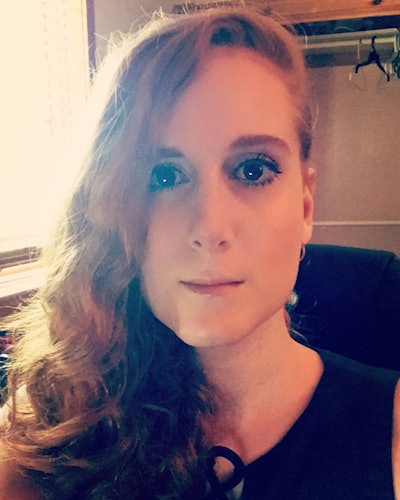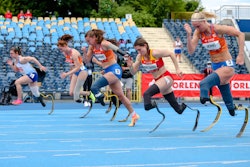In September, I opened an email from a student. Taking the form mandated by the university, it contained an accommodation letter with the student’s name, accessibility advisor, and expiry date. The student was not requesting accommodations but informing me that they had the requisite university approval should they request them down the line. I replied to the student, thanking them for the email and inviting them to email me if there was anything I could do to support them beyond the listed accommodations.
 Florence Ashley
Florence AshleyMy response—thanking the student for following the prescribed procedures—was crafted more out of formality than feeling. What I wanted to reply was: “Thanks but no thanks. I don’t need or want you to perform your disability under a medicalized, bureaucratic frame in order to listen to you. I may not always know how to listen, how to remove barriers, how to support you but I know to trust you when you tell me your accessibility needs aren’t met.”
But as a first-time course instructor whose status in the university remains precarious, I chickened out.
Reflecting on the influx of accommodation letters in my inbox, I wondered why I had never heard of the phenomenon. Why was I not told of the semestrial inpouring of accommodation letters, a testament to the bureaucratic ordeal students had to go through for teachers to respect their needs? Over the years, I have befriended many a professor both in my fields and others. But no one spoke to me of the cognitive dissonance of receiving these emails that so thinly veil the dehumanizing bureaucratic process that laid bare my students’ disability just so they could access the same education I provide to others—nondisabled others whose needs the university was designed to meet, by administrators and professors who are disproportionately not disabled. I feel ashamed that, teaching in Sexual Diversity Studies, it remains reasonable for my students to assume that I will want—nay, need—a formal letter requesting accommodations and that without one they would have to painstakingly negotiate their access to the classroom with me and each of their other teachers, often meeting refusals.
I wonder if we who are nondisabled teachers have become so desensitized to the realities of disabled students that the violence done unto them by the university has disappeared from the informal settings in which we express surprise and frustration to one another. I am scared for my students that in five, ten, twenty years, this bi-yearly shock will be so dampened that I will forget it is there as I open the students’ emails and file their accommodation letters. I dare to dream that the university will no longer be inaccessible by them, but I also know better. Disability justice activists, crip activists, and mad activists have been fighting the university for decades but in the illusion of meritocracy, they’ve told us just how elusive progress can prove.
I want to scream at the university for forcing people to prove themselves. I want to scream with the pain of being forced to prove myself outside of it. I want for my students what I want for me: to be heard. To be heard on their own terms, not on mine or the university’s. For their words to carry the same weight that society puts behind students whose needs are already met by the setup of the university without having to go through an institutional inquiry into their needs.
Re-reading what I wrote, I reflect on my reliance on aural and visual metaphors and rephrase passages. I also think about the fact that in writing about how I felt, I am centering myself and my emotions rather than my students’. Are my emotions helpful to them? My anger is less vivid now, reshaping itself into dejection.
I was never taught how to design courses for students who are deaf or blind. I was never taught how my course, if it follows the lines of every other course I have taken, will erect barriers that constitute disability for my students—and for those who will never get to be my students because of them. I try to be an attentive instructor. But dropped into the unfamiliar world of teaching, I am confronted with how little I have been taught how to attend to and care for others’ needs when they differ from mine. The university isn’t listening to disabled students if it thinks access comes through closely guarded accommodation rather than universal design. Though absolutely essential and often the only way for students to have their accessibility needs met, accessibility services also fail students by forcing them under the fold of a medico-administrative logic regardless of their beliefs, desires, and needs. This system, predicated on their otherness, falls short of the radical restructuring that our students deserve and have long asked for. In the current system, I find more slivers of Franz Kafka’s The Trial than of my beloved social justice.
From my dejection I shape one wish. May I allow myself to forget the sting of that autumnal email not because my heart grows cold but because the emails no longer come, my students’ accessibility needs already met by the university without having to navigate the serpentine mazes of accessibility services. For as long as I can remember, the university has not listened to disabled students, teachers, and advocates with care. My words contain nothing that hasn’t been expressed a thousand times over by disabled people. Why aren’t we listening?
Florence Ashley is a doctoral student at the University of Toronto Faculty of Law.
![Screenshot 2024 06 05 141719[91541]](https://img.diverseeducation.com/files/base/diverse/all/image/2024/06/Screenshot_2024_06_05_141719_91541_.66613a2803b85.png?auto=format%2Ccompress&fit=crop&h=107&q=70&w=160)




![Screenshot 2024 06 05 141719[91541]](https://img.diverseeducation.com/files/base/diverse/all/image/2024/06/Screenshot_2024_06_05_141719_91541_.66613a2803b85.png?auto=format%2Ccompress&fit=crop&h=167&q=70&w=250)













